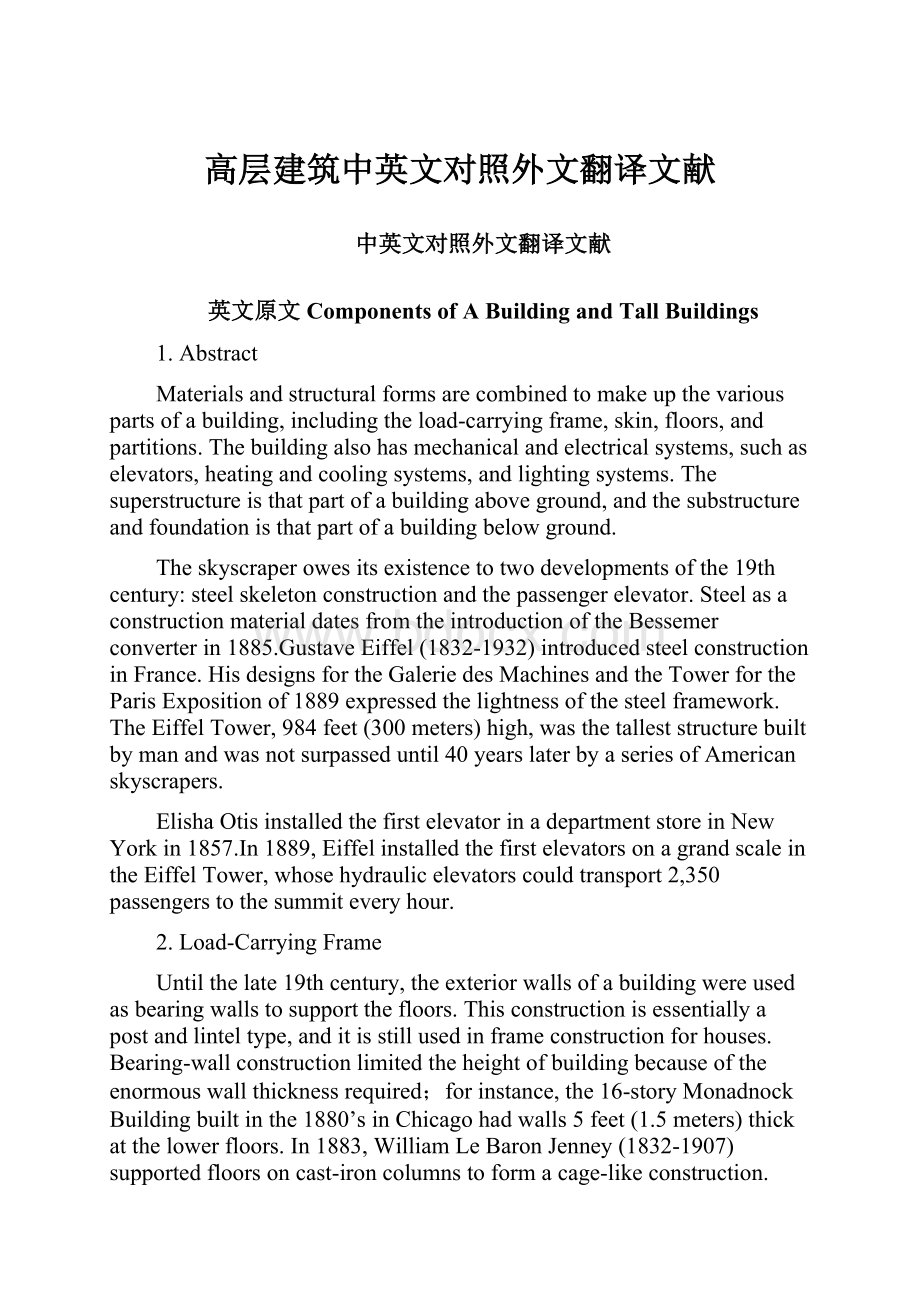高层建筑中英文对照外文翻译文献.docx
《高层建筑中英文对照外文翻译文献.docx》由会员分享,可在线阅读,更多相关《高层建筑中英文对照外文翻译文献.docx(9页珍藏版)》请在冰豆网上搜索。

高层建筑中英文对照外文翻译文献
中英文对照外文翻译文献
英文原文ComponentsofABuildingandTallBuildings
1.Abstract
Materialsandstructuralformsarecombinedtomakeupthevariouspartsofabuilding,includingtheload-carryingframe,skin,floors,andpartitions.Thebuildingalsohasmechanicalandelectricalsystems,suchaselevators,heatingandcoolingsystems,andlightingsystems.Thesuperstructureisthatpartofabuildingaboveground,andthesubstructureandfoundationisthatpartofabuildingbelowground.
Theskyscraperowesitsexistencetotwodevelopmentsofthe19thcentury:
steelskeletonconstructionandthepassengerelevator.SteelasaconstructionmaterialdatesfromtheintroductionoftheBessemerconverterin1885.GustaveEiffel(1832-1932)introducedsteelconstructioninFrance.HisdesignsfortheGaleriedesMachinesandtheTowerfortheParisExpositionof1889expressedthelightnessofthesteelframework.TheEiffelTower,984feet(300meters)high,wasthetalleststructurebuiltbymanandwasnotsurpasseduntil40yearslaterbyaseriesofAmericanskyscrapers.
ElishaOtisinstalledthefirstelevatorinadepartmentstoreinNewYorkin1857.In1889,EiffelinstalledthefirstelevatorsonagrandscaleintheEiffelTower,whosehydraulicelevatorscouldtransport2,350passengerstothesummiteveryhour.
2.Load-CarryingFrame
Untilthelate19thcentury,theexteriorwallsofabuildingwereusedasbearingwallstosupportthefloors.Thisconstructionisessentiallyapostandlinteltype,anditisstillusedinframeconstructionforhouses.Bearing-wallconstructionlimitedtheheightofbuildingbecauseoftheenormouswallthicknessrequired;forinstance,the16-storyMonadnockBuildingbuiltinthe1880’sinChicagohadwalls5feet(1.5meters)thickatthelowerfloors.In1883,WilliamLeBaronJenney(1832-1907)supportedfloorsoncast-ironcolumnstoformacage-likeconstruction.Skeletonconstruction,consistingofsteelbeamsandcolumns,wasfirstusedin1889.Asaconsequenceofskeletonconstruction,theenclosingwallsbecomea“curtainwall”ratherthanservingasupportingfunction.Masonrywasthecurtainwallmaterialuntilthe1930’s,whenlightmetalandglasscurtainwallswereused.Aftertheintroductionofbuildingscontinuedtoincreaserapidly.
AlltallbuildingswerebuiltwithaskeletonofsteeluntilWorldWarⅡ.Afterthewar,theshortageofsteelandtheimprovedqualityofconcreteledtotallbuildingbeingbuiltofreinforcedconcrete.MarinaTower(1962)inChicagoisthetallestconcretebuildingintheUnitedStates;itsheight—588feet(179meters)—isexceededbythe650-foot(198-meter)PostOfficeTowerinLondonandbyothertowers.
Achangeinattitudeaboutskyscraperconstructionhasbroughtareturntotheuseofthebearingwall.InNewYorkCity,theColumbiaBroadcastingSystemBuilding,designedbyEeroSaarinenin1962,hasaperimeterwallconsistingof5-foot(1.5meter)wideconcretecolumnsspaced10feet(3meters)fromcolumncentertocenter.Thisperimeterwall,ineffect,constitutesabearingwall.Onereasonforthistrendisthatstiffnessagainsttheactionofwindcanbeeconomicallyobtainedbyusingthewallsofthebuildingasatube;theWorldTradeCenterbuildingisanotherexampleofthistubeapproach.Incontrast,rigidframesorverticaltrussesareusuallyprovidedtogivelateralstability.
3.Skin
Theskinofabuildingconsistsofbothtransparentelements(windows)andopaqueelements(walls).Windowsaretraditionallyglass,althoughplasticsarebeingused,especiallyinschoolswherebreakagecreatesamaintenanceproblem.Thewallelements,whichareusedtocoverthestructureandaresupportedbyit,arebuiltofavarietyofmaterials:
brick,precastconcrete,stone,opaqueglass,plastics,steel,andaluminum.Woodisusedmainlyinhouseconstruction;itisnotgenerallyusedforcommercial,industrial,orpublicbuildingbecauseofthefirehazard.
4.Floors
Theconstructionofthefloorsinabuildingdependsonthebasicstructuralframethatisused.Insteelskeletonconstruction,floorsareeitherslabsofconcreterestingonsteelbeamsoradeckconsistingofcorrugatedsteelwithaconcretetopping.Inconcreteconstruction,thefloorsareeitherslabsofconcreteonconcretebeamsoraseriesofcloselyspacedconcretebeams(ribs)intwodirectionstoppedwithathinconcreteslab,givingtheappearanceofawaffleonitsunderside.Thekindoffloorthatisuseddependsonthespanbetweensupportingcolumnsorwallsandthefunctionofthespace.Inanapartmentbuilding,forinstance,wherewallsandcolumnsarespacedat12to18feet(3.7to5.5meters),themostpopularconstructionisasolidconcreteslabwithnobeams.Theundersideoftheslabservesastheceilingforthespacebelowit.Corrugatedsteeldecksareoftenusedinofficebuildingsbecausethecorrugations,whenenclosedbyanothersheetofmetal,formductsfortelephoneandelectricallines.
5.MechanicalandElectricalSystems
Amodernbuildingnotonlycontainsthespaceforwhichitisintended(office,classroom,apartment)butalsocontainsancillaryspaceformechanicalandelectricalsystemsthathelptoprovideacomfortableenvironment.Theseancillaryspacesinaskyscraperofficebuildingmayconstitute25%ofthetotalbuildingarea.Theimportanceofheating,ventilating,electrical,andplumbingsystemsinanofficebuildingisshownbythefactthat40%oftheconstructionbudgetisallocatedtothem.Becauseoftheincreaseduseofsealedbuildingwithwindowsthatcannotbeopened,elaboratemechanicalsystemsareprovidedforventilationandairconditioning.Ductsandpipescarryfreshairfromcentralfanroomsandairconditioningmachinery.Theceiling,whichissuspendedbelowtheupperfloorconstruction,concealstheductworkandcontainsthelightingunits.Electricalwiringforpowerandfortelephonecommunicationmayalsobelocatedinthisceilingspaceormaybeburiedinthefloorconstructioninpipesorconduits.
Therehavebeenattemptstoincorporatethemechanicalandelectricalsystemsintothearchitectureofbuildingbyfranklyexpressingthem;forexample,theAmericanRepublicInsuranceCompanyBuilding(1965)inDesMoines,Iowa,exposesboththeductsandthefloorstructureinanorganizedandelegantpatternanddispenseswiththesuspendedceiling.Thistypeofapproachmakesitpossibletoreducethecostofthebuildingandpermitsinnovations,suchasinthespanofthestructure.
6.SoilsandFoundations
Allbuildingaresupportedontheground,andthereforethenatureofthesoilbecomesanextremelyimportantconsiderationinthedesignofanybuilding.Thedesignofafoundationdepends
onmanysoilfactors,suchastypeofsoil,soilstratification,thicknessofsoillaversandtheircompaction,andgroundwaterconditions.Soilsrarelyhaveasinglecomposition;theygenerallyaremixturesinlayersofvaryingthickness.Forevaluation,soilsaregradedaccordingtoparticlesize,whichincreasesfromsilttoclaytosandtograveltorock.Ingeneral,thelargerparticlesoilswillsupportheavierloadsthanthesmallerones.Thehardestrockcansupportloadsupto100tonspersquarefoot(976.5metrictons/sqmeter),butthesoftestsiltcansupportaloadofonly0.25tonpersquarefoot(2.44metrictons/sqmeter).Allsoilsbeneaththesurfaceareinastateofcompaction;thatis,theyareunderapressurethatisequaltotheweightofthesoilcolumnaboveit.Manysoils(exceptformostsandsandgavels)exhibitelasticproperties—theydeformwhencompressedunderloadandreboundwhentheloadisremoved.Theelasticityofsoilsisoftentime-dependent,thatis,deformationsofthesoiloccuroveralengthoftimewhichmayvaryfromminutestoyearsafteraloadisimposed.Overaperiodoftime,abuildingmaysettleifitimposesaloadonthesoilgreaterthanthenaturalcompactionweightofthesoil.Conversely,abuildingmayheaveifitimposesloadsonthesoilsmallerthanthenaturalcompactionweight.Thesoilmayalsoflowundertheweightofabuilding;thatis,ittendstobesqueezedout.
Duetoboththecompactionandfloweffects,buildingstendsettle.Unevensettlements,exemplifiedbytheleaningtowersinPisaandBologna,canhavedamagingeffects—thebuildingmaylean,wallsandpartitionsmaycrack,windowsanddoorsmaybecomeinoperative,and,intheextreme,abuildingmaycollapse.Uniformsettlementsarenotsoserious,althoughextremeconditions,suchasthoseinMexicoCity,canhaveseriousconsequences.Overthepast100years,achangeinthegroundwaterleveltherehascausedsomebuildingstosettlemorethan10feet(3meters).Becausesuchmovementscanoccurduringandafterconstruction,carefulanalysisofthebehaviorofsoilsunderabuildingisvital.
Thegreatvariabilityofsoilshasledtoavarietyofsolutionstothefoundationproblem.Where
firmsoilexistsclosetothesurface,thesimplestsolutionistorestcolumnsonasmallslabofconcrete(spreadfooting).Wherethesoilissofter,itisnecessarytospreadthecolumnloadoveragreaterarea;inthiscase,acontinuousslabofconcrete(raftormat)underthewholebuildingisused.Incaseswherethesoilnearthesurfaceisunabletosupporttheweightofthebuilding,pilesofwood,steel,orconcretearedrivendowntofirmsoil.
Theconstructionofabuildingproceedsnaturallyfromthefoundationuptothesuperstructure.Thedesignprocess,however,proceedsfromtheroofdowntothefoundation(inthedirectionofgravity).Inthepast,thefoundationwasnotsubjecttosystematicinvestigation.Ascientificapproachtothedesignoffoundationshasbeendevelopedinthe20thcentury.KarlTerzagh